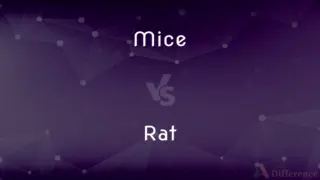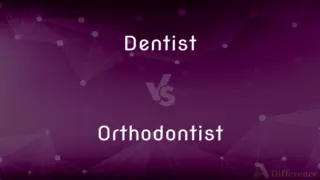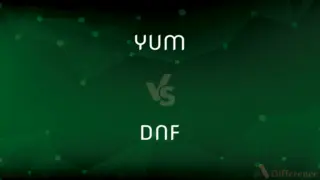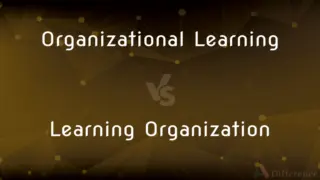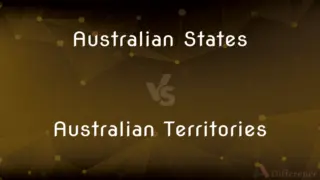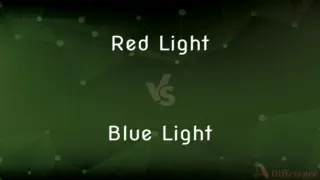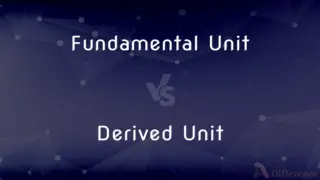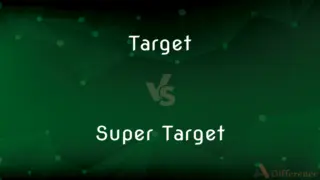Element vs. Unit — What's the Difference?
By Tayyaba Rehman & Maham Liaqat — Updated on April 30, 2024
An element is a fundamental component of a larger system with distinct characteristics, while a unit is a standard measure or a distinct part of a machinery or structure.

Difference Between Element and Unit
Table of Contents
ADVERTISEMENT
Key Differences
An element refers to a basic, essential part of a whole that cannot be broken down further without losing its unique properties. In contrast, a unit is often a measure of quantity used in various fields like mathematics, science, and engineering to standardize calculations.
In chemistry, an element is defined as a substance consisting of atoms that all have the same number of protons. On the other hand, a unit in this context could refer to a mole, which measures the amount of a chemical substance.
In mathematics, elements are individual objects within a set, crucial to the structure of mathematical theory. Conversely, units in mathematics might refer to the identity element of a group, or a standard measurement used for comparison.
In computer programming, an element could refer to a single data item in an array or a list. Whereas a unit in programming might denote a module or component that performs a specific function, integral to software development.
In literature, an element might be a particular aspect such as plot, setting, or character, essential for narrative construction. Conversely, a unit could be considered a chapter or paragraph, serving as a building block of the written work.
ADVERTISEMENT
Comparison Chart
Definition
A fundamental or essential constituent of a complex system.
A standard measurement or a discrete part of a larger system.
In Chemistry
A substance made of atoms with the same number of protons.
A quantity used for measurement like a mole.
In Mathematics
An individual object within a set.
A standard measure or identity in algebraic structures.
In Programming
A single data item in an array.
A modular component of software.
In Literature
A foundational aspect such as plot or character.
A structural component like a chapter.
Compare with Definitions
Element
A basic component of a compound.
Hydrogen is an element in water.
Unit
A discrete element used in teaching.
The course is divided into different thematic units.
Element
A natural habitat, as used metaphorically.
Fish are in their element in water.
Unit
A standard measure of quantity.
The meter is a unit of length.
Element
A member of a set in mathematics.
In the set {1, 2, 3}, 2 is an element.
Unit
A military subdivision.
A platoon is a unit smaller than a company.
Element
A part of a larger whole in electronics.
Each pixel is an element of the display screen.
Unit
An item of furniture or equipment.
Each kitchen unit was carefully installed.
Element
An essential aspect in a system.
Trust is a key element of a successful team.
Unit
An individual segment or component of a larger entity.
An apartment is a unit in a building complex.
Element
A fundamental, essential, or irreducible constituent of a composite entity.
Unit
An individual, group, structure, or other entity regarded as an elementary structural or functional constituent of a whole.
Element
Elements The basic assumptions or principles of a subject.
Unit
A group regarded as a distinct entity within a larger group.
Element
A member of a set.
Unit
A mechanical part or module.
Element
A point, line, or plane.
Unit
An entire apparatus or the equipment that performs a specific function.
Element
A part of a geometric configuration, such as an angle in a triangle.
Unit
A precisely specified quantity in terms of which the magnitudes of other quantities of the same kind can be stated.
Element
The generatrix of a geometric figure.
Unit
(Medicine) The quantity of a vaccine, serum, drug, or other agent necessary to produce a specific effect.
Element
Any of the terms in the rectangular array of terms that constitute a matrix or determinant.
Unit
A fixed amount of scholastic study used as a basis for calculating academic credits, usually measured in hours of classroom instruction or laboratory work.
Element
Chemistry & Physics A substance composed of atoms having an identical number of protons in each nucleus. Elements cannot be reduced to simpler substances by normal chemical means. See Periodic Table.
Unit
A section of an academic course focusing on a selected theme
A unit on Native Americans.
Element
One of four substances, earth, air, fire, or water, formerly regarded as a fundamental constituent of the universe.
Unit
The number immediately to the left of the decimal point in the Arabic numeral system.
Element
(Electricity)The resistance wire in an electrical appliance such as a heater or an oven.
Unit
The lowest positive whole number; one.
Element
Elements The forces that constitute the weather, especially severe or inclement weather:outside paint that had been damaged by the elements.
Unit
An element of a ring with a multiplicative inverse.
Element
An environment naturally suited to or associated with an individual:He is in his element when traveling. The business world is her element.
Unit
(mathematics) Oneness, singularity, seen as a component of a whole number; a magnitude of one.
Element
A distinct group within a larger community:the dissident element on campus.
Unit
(sciences) A standard measure of a quantity.
The centimetre is a unit of length.
Element
A ground unit in an air force comparable to a platoon.
Unit
The number one.
Element
A unit of an air force equal to two or three aircraft.
Unit
Ellipsis of international unit
This pill provides 500 units of Vitamin E.
Element
Elements The bread and wine of the Eucharist.
Unit
An organized group comprising people and/or equipment.
He was a member of a special police unit.
Element
One of the simplest or essential parts or principles of which anything consists, or upon which the constitution or fundamental powers of anything are based.
Letters are the elements of written language.
Unit
A member of a military organization.
The fifth tank brigade moved in with 20 units. (i.e., 20 tanks)
Element
(chemistry) Any one of the simplest chemical substances that cannot be decomposed in a chemical reaction or by any chemical means and made up of atoms all having the same number of protons.
Unit
(commerce) An item which may be sold singly.
We shipped nearly twice as many units this month as last month.
Element
One of the four basic building blocks of matter in theories of ancient philosophers and alchemists: water, earth, fire, and air.
Unit
Any piece of equipment, such as an appliance, power tool, stereo system, computer, tractor, or machinery.
This air-conditioner is the most efficient unit we sell.
Element
A basic, simple substance out of which something is made, raw material.
Unit
A measure of housing equivalent to the living quarters of one household; an apartment where a group of apartments is contained in one or more multi-storied buildings or a group of dwellings is in one or more single storey buildings, usually arranged around a driveway.
The new apartment complex will have 50 units.
Element
(legal) A required aspect or component of a cause of action. A deed is regarded as a violation of law only if each element can be proved.
Unit
Any military element whose structure is prescribed by competent authority, such as a table of organization and equipment; specifically, part of an organization.
Element
(set theory) One of the objects in a set.
Unit
An organization title of a subdivision of a group in a task force.
Element
(mathematics) One of the entries of a matrix.
Unit
A standard or basic quantity into which an item of supply is divided, issued, or detailed. In this meaning, also called unit of issue.
Element
Any of the teeth of a zip fastener.
Unit
With regard to Reserve Components of the Armed Forces, denotes a Selected Reserve unit organized, equipped, and trained for mobilization to serve on active duty as a unit or to augment or be augmented by another unit. Headquarters and support functions without wartime missions are not considered units.
Element
A small part of the whole.
An element of the picture
Unit
(algebra) The identity element, neutral element.
Element
A small but present amount of a quality, a hint.
An element of doubt
Unit
(algebra) An element having an inverse, an invertible element; an associate of the unity.
Regular element
Element
A factor, one of the conditions contributing to a result.
Unit
(category theory) In an adjunction, a natural transformation from the identity functor of the domain of the left adjoint functor to the composition of the right adjoint functor with the left adjoint functor.
Element
(obsolete) The sky.
Unit
(geology) A volume of rock or ice of identifiable origin and age range that is defined by the distinctive and dominant, easily mapped and recognizable petrographic, lithologic or paleontologic features (facies) that characterize it.
Element
(obsolete) Any one of the heavenly spheres believed to carry the celestial bodies.
Unit
(UK) A unit of alcohol.
Element
Atmospheric forces such as strong winds and rains.
Exposed to the elements
Unit
One kilowatt-hour (as recorded on an electricity meter).
Element
A place or state of being that an individual or object is best suited to.
To be in one's element
Unit
(historical) A gold coin of the reign of James I, worth twenty shillings.
Element
The bread and wine taken at Holy Communion.
Unit
A work unit.
Element
A group of people within a larger group having a particular common characteristic.
You sometimes find the hooligan element at football matches.
Unit
A physically large person.
Element
(in the plural only) The basic principles of a field of knowledge, basics, fundamentals, rudiments.
Unit
For each unit.
We have to keep our unit costs down if we want to make a profit.
Element
A component in electrical equipment, often in the form of a coil, having a high resistance, thereby generating heat when a current is passed through it.
The element in this electric kettle can heat the water in under a minute.
Unit
(mathematics) Having a size or magnitude of one.
Element
(mathematics) An infinitesimal interval of a quantity, a differential.
The element of area in Cartesian coordinates is dx dy.
Unit
A single thing or person.
Element
(astronomy) An orbital element; one of the parameters needed to uniquely specify a particular orbit.
Unit
The least whole number; one.
Units are the integral parts of any large number.
Element
(computing) One of the conceptual objects in a markup language, usually represented in text by tags.
Unit
A gold coin of the reign of James I., of the value of twenty shillings.
Element
(obsolete) To compound of elements.
Unit
Any determinate amount or quantity (as of length, time, heat, value) adopted as a standard of measurement for other amounts or quantities of the same kind.
Element
(obsolete) To constitute and be the elements of.
Unit
A single thing, as a magnitude or number, regarded as an undivided whole.
Element
One of the simplest or essential parts or principles of which anything consists, or upon which the constitution or fundamental powers of anything are based.
Unit
Any division of quantity accepted as a standard of measurement or exchange;
The dollar is the United States unit of currency
A unit of wheat is a bushel
Change per unit volume
Element
One of the ultimate, undecomposable constituents of any kind of matter. Specifically: (Chem.) A substance which cannot be decomposed into different kinds of matter by any means at present employed; as, the elements of water are oxygen and hydrogen.
Unit
An individual or group or structure or other entity regarded as a structural or functional constituent of a whole;
The reduced the number of units and installations
The word is a basic linguistic unit
Element
One of the ultimate parts which are variously combined in anything; as, letters are the elements of written language; hence, also, a simple portion of that which is complex, as a shaft, lever, wheel, or any simple part in a machine; one of the essential ingredients of any mixture; a constituent part; as, quartz, feldspar, and mica are the elements of granite.
The simplicity which is so large an element in a noble nature was laughed to scorn.
Unit
An organization regarded as part of a larger social group;
The coach said the offensive unit did a good job
After the battle the soldier had trouble rejoining his unit
Element
One out of several parts combined in a system of aggregation, when each is of the nature of the whole; as, a single cell is an element of the honeycomb.
Unit
A single undivided whole;
An idea is not a unit that can be moved from one brain to another
Element
One of the simplest essential parts, more commonly called cells, of which animal and vegetable organisms, or their tissues and organs, are composed.
Unit
A single undivided natural thing occurring in the composition of something else;
Units of nucleic acids
Element
An infinitesimal part of anything of the same nature as the entire magnitude considered; as, in a solid an element may be the infinitesimal portion between any two planes that are separated an indefinitely small distance. In the calculus, element is sometimes used as synonymous with differential.
Unit
An assemblage of parts that is regarded as a single entity;
How big is that part compared to the whole?
The team is a unit
Element
One of the necessary data or values upon which a system of calculations depends, or general conclusions are based; as, the elements of a planet's orbit.
Element
The simplest or fundamental principles of any system in philosophy, science, or art; rudiments; as, the elements of geometry, or of music.
Element
Any outline or sketch, regarded as containing the fundamental ideas or features of the thing in question; as, the elements of a plan.
Element
One of the simple substances, as supposed by the ancient philosophers; one of the imaginary principles of matter.
Of elementsThe grosser feeds the purer: Earth the Sea;Earth and the Sea feed Air; the Air those FiresEthereal.
Does not our life consist of the four elements?
And the complexion of the element [i. e.,the sky or air]In favor's like the work we have in hand,Most bloody, fiery, and most terrible.
About twelve ounces [of food], with mere element for drink.
They show that they are out of their element.
Element
The conditions and movements of the air.
Element
The whole material composing the world.
The elements shall melt with fervent heat.
Element
The bread and wine used in the eucharist or Lord's supper.
Element
To compound of elements or first principles.
Element
To constitute; to make up with elements.
His very soul was elemented of nothing but sadness.
Element
An abstract part of something;
Jealousy was a component of his character
Two constituents of a musical composition are melody and harmony
The grammatical elements of a sentence
A key factor in her success
Humor: an effective ingredient of a speech
Element
Any of the more than 100 known substances (of which 92 occur naturally) that cannot be separated into simpler substances and that singly or in combination constitute all matter
Element
An artifact that is one of the individual parts of which a composite entity is made up; especially a part that can be separated from or attached to a system;
Spare components for cars
A component or constituent element of a system
Element
One of four substances thought in ancient and medieval cosmology to constitute the physical universe;
The alchemists believed that there were four elements
Element
The most favorable environment for a plant or animal;
Water is the element of fishes
Element
The situation in which you are happiest and most effective;
In your element
Element
A straight line that generates a cylinder or cone
Common Curiosities
Are units standardized internationally?
Yes, units are standardized internationally through agreements like the Metric System to ensure consistency in measurements globally.
What role does an element play in a chemical reaction?
An element participates in chemical reactions according to its properties and can combine with other elements to form compounds.
Can elements exist in different forms?
Yes, elements can exist in different physical forms such as solid, liquid, and gas, which are known as states of matter.
How is a unit important in daily life?
Units are crucial for everyday activities such as cooking, where measurements like cups and teaspoons are used, and for buying groceries, where items are priced per unit weight or volume.
What is a fundamental element in physics?
In physics, a fundamental element often refers to basic constituents of matter like electrons, protons, and neutrons, or to essential principles like force and energy.
What determines the unit used in a specific scientific measurement?
The unit used in scientific measurements is determined by the property being measured, the precision required, and international standards or norms.
What is the smallest unit of an element?
The smallest unit of an element that retains its identity is an atom of that element.
How do units affect calculations in engineering?
Units are fundamental in engineering calculations to ensure accuracy and safety in design, construction, and operation of engineering projects.
What is an example of an element in technology?
In technology, a common example of an element is silicon, which is used extensively in the semiconductor industry to make integrated circuits and computer chips.
Is an element the same as a compound?
No, an element is a pure substance made of only one type of atom, whereas a compound is made up of two or more different types of atoms chemically bonded together.
What units are used in digital media?
In digital media, common units include pixels for image resolution, bytes for data size, and frames per second for video speed.
How are units used in healthcare?
Units are used in healthcare for dosing medications, measuring patient vitals like blood pressure and temperature, and quantifying medical test results.
Can the elements of a system be unrelated?
Typically, elements of a system share a functional or thematic relationship, but they may appear unrelated when their connection is part of a larger, more complex system.
Why are elements important in understanding the universe?
Elements are crucial in understanding the universe because they are the building blocks of all matter, and studying them helps explain the composition, behavior, and evolution of objects in the universe.
How do units vary in different fields of study?
Units vary significantly across fields; for example, units in physics like joules or watts differ from those in economics like dollars or units of goods.
Share Your Discovery

Previous Comparison
Microinch vs. Micron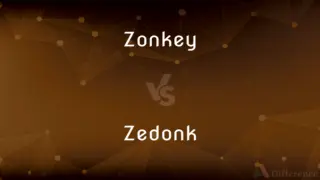
Next Comparison
Zonkey vs. ZedonkAuthor Spotlight
Written by
Tayyaba RehmanTayyaba Rehman is a distinguished writer, currently serving as a primary contributor to askdifference.com. As a researcher in semantics and etymology, Tayyaba's passion for the complexity of languages and their distinctions has found a perfect home on the platform. Tayyaba delves into the intricacies of language, distinguishing between commonly confused words and phrases, thereby providing clarity for readers worldwide.
Co-written by
Maham Liaqat























